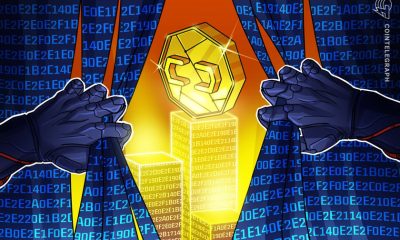Blockchain
Young Koreans’ debt soars as they turn to crypto, stocks and real estate

Millennials and Gen Z in South Korea have been struggling to survive an economy characterized by high asset inflation and suppressed wages.
Household debt for younger Koreans — those born from the 1980s onward — has surged to $22.7 billion, up from $3.9 billion from last year.
Data from South Korea’s Financial Supervisory Service (FSS), released today by Representative Kim Han-jeong of the Democratic Party of Korea, reportedly indicates that the high levels of lending are attributable to an increase in investments in cryptocurrencies, stocks and real estate.
While millennials and Gen Z accounted for roughly 34% of total household debt in Korea in 2019, that figure grew to 45.5% by 2020 and is now at 50.7%. Rep. Kim has called for government measures to help manage the debt and reduce the risks of default, stating:
“They have been lending excessively to buy real estate amid surging asset prices. The young generations have been burying themselves in stock investment and buying cryptocurrencies.”
The FSS data provides a degree of granularity, revealing that these generations’ home-backed lending has soared from $2.8 billion to $16 billion, while credit loans increased from $1.1 billion to $6.7 billion on the year.
Rising debt has become a fundamental part of the wider socio-economic story of younger Koreans. A Bloomberg article published in fall 2020, aptly titled “Broke Millennials Turn to Day Trading to Strike It Rich in Korea,” cited one 27-year old who said:
“In Korea, us 20-somethings only have two ways to get rich: Either we win the lottery or trade shares. We know we will never be rich on whatever wages we earn. We will never earn enough to buy a home.”
While the article focused on the turn to day trading in traditional stocks on apps like Robinhood, the same underlying dynamic — suppressed wages, a “frozen job market” and rising real-estate prices — is fueling their reliance on bank loans to make other investments they believe could pay off in the medium- or long-term, such as crypto and real estate.
Lee Han Koo, an economics professor at the University of Suwon, characterized this dynamic as “desperate,” noting that this socio-economic environment has fueled a perception among youth that trading represents a “once-in-a-lifetime opportunity” to break out of an insurmountable impasse.
Related: South Korea’s ‘Kimchi premium’ is back: Is the Bitcoin rally starting to heat up?
According to an IMF report from August 2020, Koreans’ household debt-to-disposal income of 180% is now the highest among OECD countries. House prices, as in many OECD countries, have been on an uninterrupted tear since 2014. Whereas the country’s gross national income per capita is $32,047, the median price of apartments in Seoul — where half of the population lives and half of the firms are based — was close to $800,000 last fall.
Locked out of the housing market and trapped by stagnant wages, Koreans’ turn to speculation — ranging from hedge funds to biotech to crypto — was central to Bitcoin’s (BTC) infamous “Kimchi bubble” of 2017. With longer-term economic trends now exacerbated by the pandemic, Bitcoin’s premium in Korea again surged to yearly highs this spring.

















